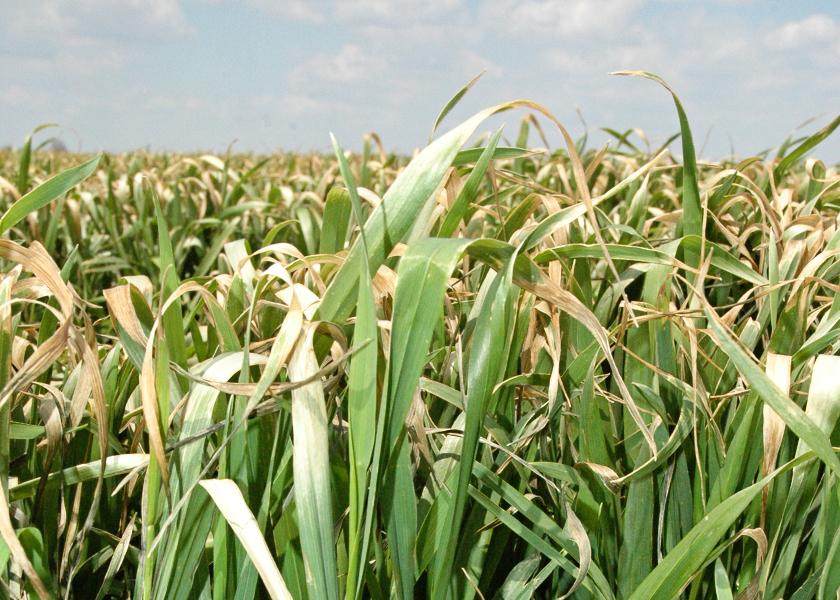Brutal Blast of Cold Set to Bring Widespread Freeze to the Western Corn Belt and Plains

Meteorologists say much of the country should brace for freezing temperatures this weekend and into early next week. The late April blast of cold weather doesn’t pose a big risk for the corn already planted in fields, but there are growing concerns about the potential damage to winter wheat.
USDA meteorologist Brad Rippey thinks the freezing temperatures could drop as far south as Texas.
“We are going to be watching at the end of this week on into next week some cold air that's been kind of pulled up over Alaska in western North America swinging southward,” says Rippey. “And by the time we get to this weekend and on into early next week, we can easily see sub-freezing temperatures all the way down into north Texas. So, that means everybody north of that, including the northwestern half of Oklahoma, much of Kansas, all those areas should experience freezes.”
Friday night expected Kansas freezing temps. 22-27F West. 30-35F C and E. pic.twitter.com/p7M3yKjIxp — Allen Motew (@QTweather) April 19, 2023
Rippey points out winter wheat is already heading in some of those geographies, including southern Oklahoma and parts of Texas.
“So, that is a concern where you overlap some freezing temperatures and heading winter wheat, with the part of the crop that's even still viable, could be harmed by sub-freezing temperatures over the next few days,” says Rippey. “And unfortunately, that pattern seems like it's going to continue. Although I think in time as we head into late April and early May, some of that colder air may spill more into the Midwest than the Great Plains. But this initial shot will deliver freezes likely as far south as at least the northern panhandle of Texas.
Rippey says he’s not as concerned about the corn crop that’s already planted since the crop either hasn’t emerged or the crop is still young enough that the growing point is below the soil.
“I think soils are warm enough to help insulate that growing point at this early stage. And as you move to the far north where it's going to be really cold, we don't have any corn planted yet. So I think we'll be okay with the summer crops at this early stage,” says Rippey.
Western Belt freezing temps Friday night. pic.twitter.com/mlVKk4LYNp — Allen Motew (@QTweather) April 19, 2023
Drew Lerner of World Weather has been keeping an eye on this weather pattern for more than a week. He originally warned about the possibility for a crop-damaging freeze late last week, but also said it was too early to see just how widespread the cold would be.
His latest forecast is colder than NOAA’s, but he points out crops may not be far enough along in potential problem areas.
“NOAA’s map is too warm, though, frost and freezes will occur southward into northern Oklahoma, southern Missouri and parts of Kentucky with Saturday's coolest in the central Plains and Sunday's and Monday's coolest in the Midwest and middle Atlantic Coast States respectively,” says Lerner.
“Wheat, rye and oats are heading in the south of Oklahoma while canola is flowering. We are not expecting much more than frost in those areas, but it might be an area to watch. Most of the wheat in the lower Midwest is not far enough advanced to be impacted in a permanent negative manner,” says Lerner.
For the week ending April 16, 2023, there were 6.1 days
suitable for fieldwork, according to @USDA_NASS Winter wheat condition rated 60% very poor to poor, 26% fair, 14% good to excellent. Winter wheat jointed was 27%, behind 32% last year and 35% for the five-year average. pic.twitter.com/KkW31zYOdL — KansasWheat (@KansasWheat) April 18, 2023
Winter wheat conditions are already in historically poor condition. Kansas’ crop is rated 60% poor to very poor, Oklahoma has 53% of the crop in the worst two categories and the Texas winter wheat crop is rated 52% poor to very poor.
“If you look at U.S. winter wheat conditions as a whole, as of April 16, we are seeing our lowest overall U.S. winter wheat conditions since the spring of 1996, and it's really driven by these really abysmal numbers across the Central and Southern Great Plains,” says Rippey. “Right up and down the Central and Southern Great Plains everywhere, it’s almost every day that passes here, we're losing more of this crop. Some of it never emerged. Some of it's incredibly poorly established. And each passing day now in April, as the warmth, the wind and the dryness continue, we're seeing lowering of those yield prospects and expectations for higher abandonment.”
From the dry weather and intense winds, to now the frigid air that could hit the crop into the weekend, winter wheat conditions continue to see weather challenges this year.







